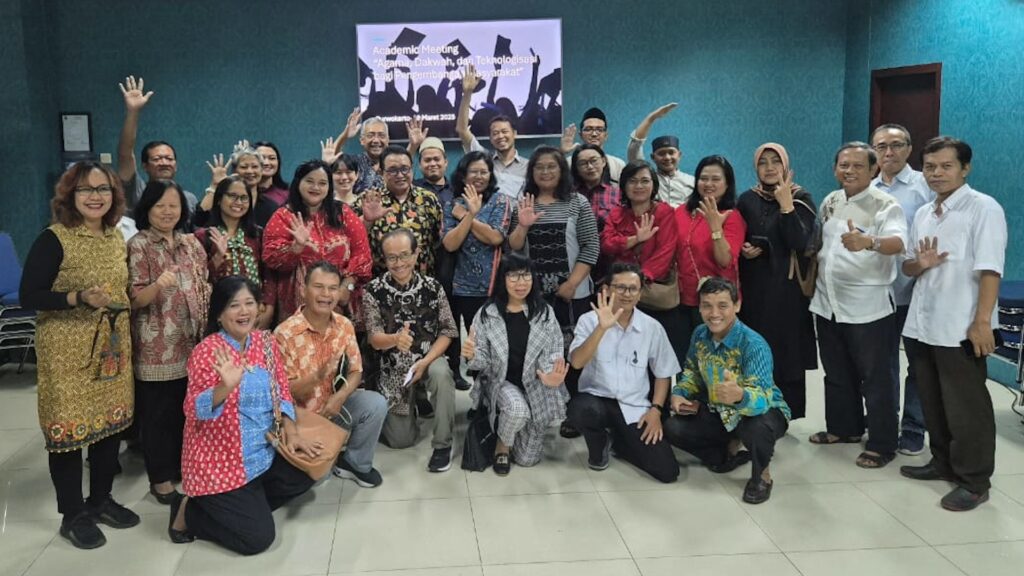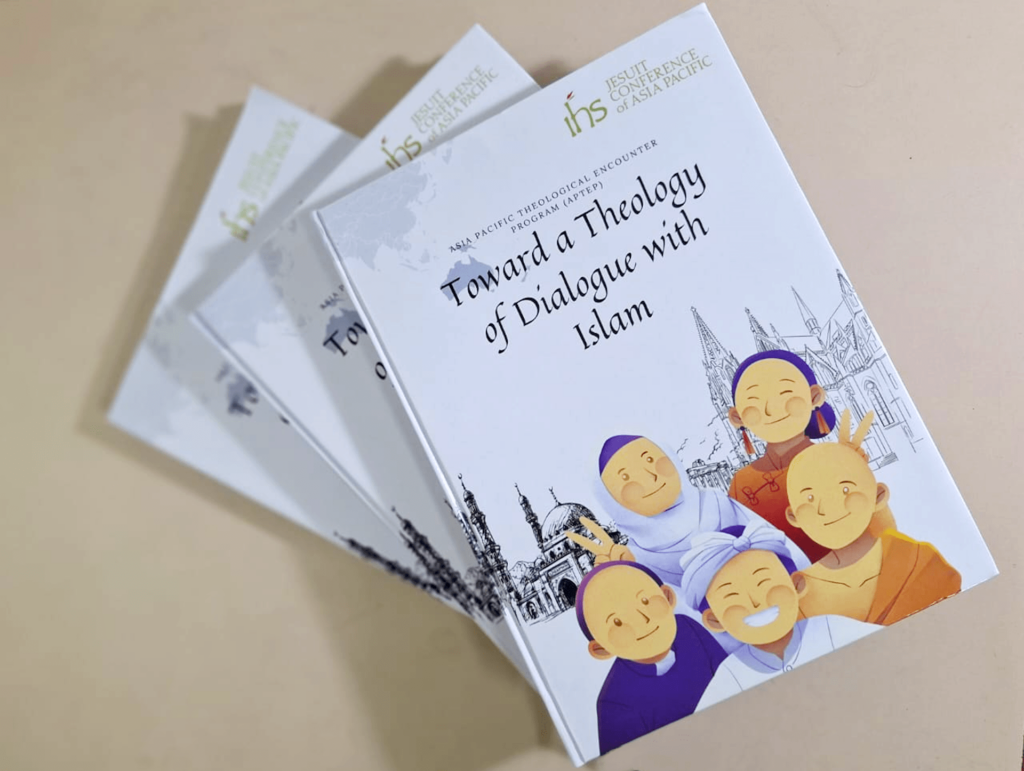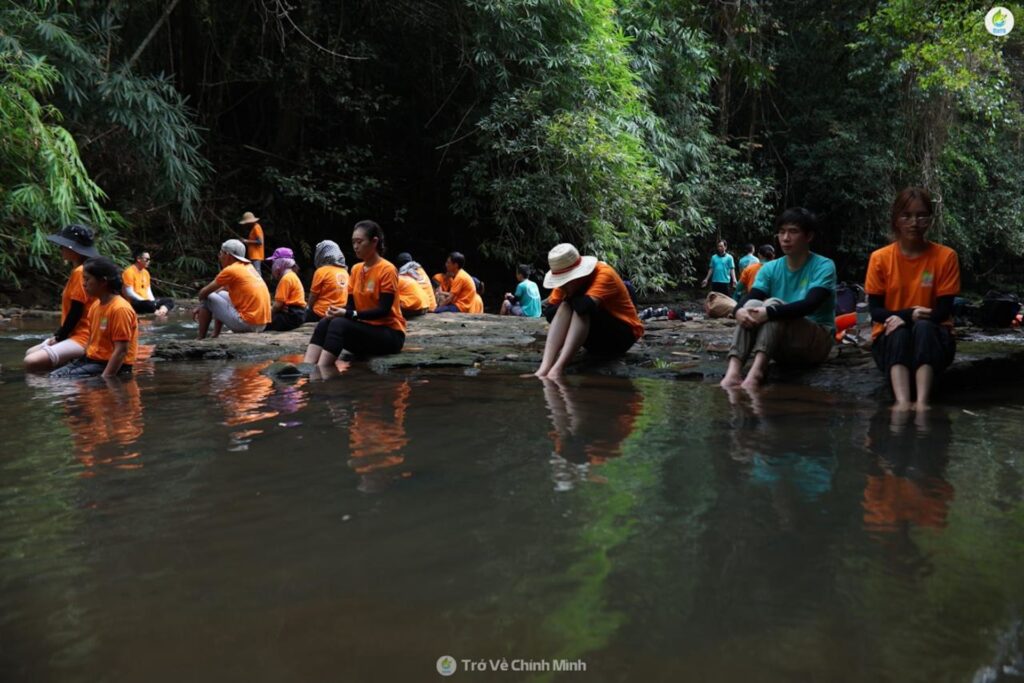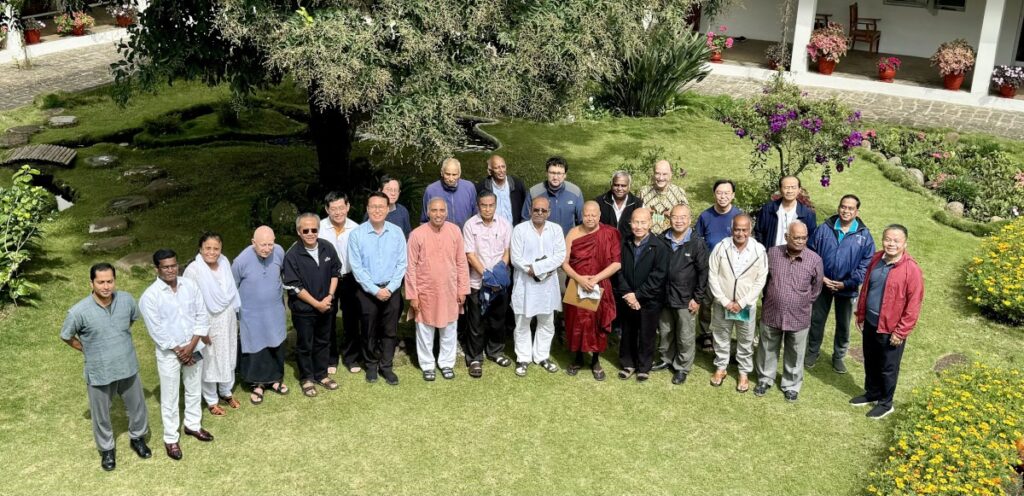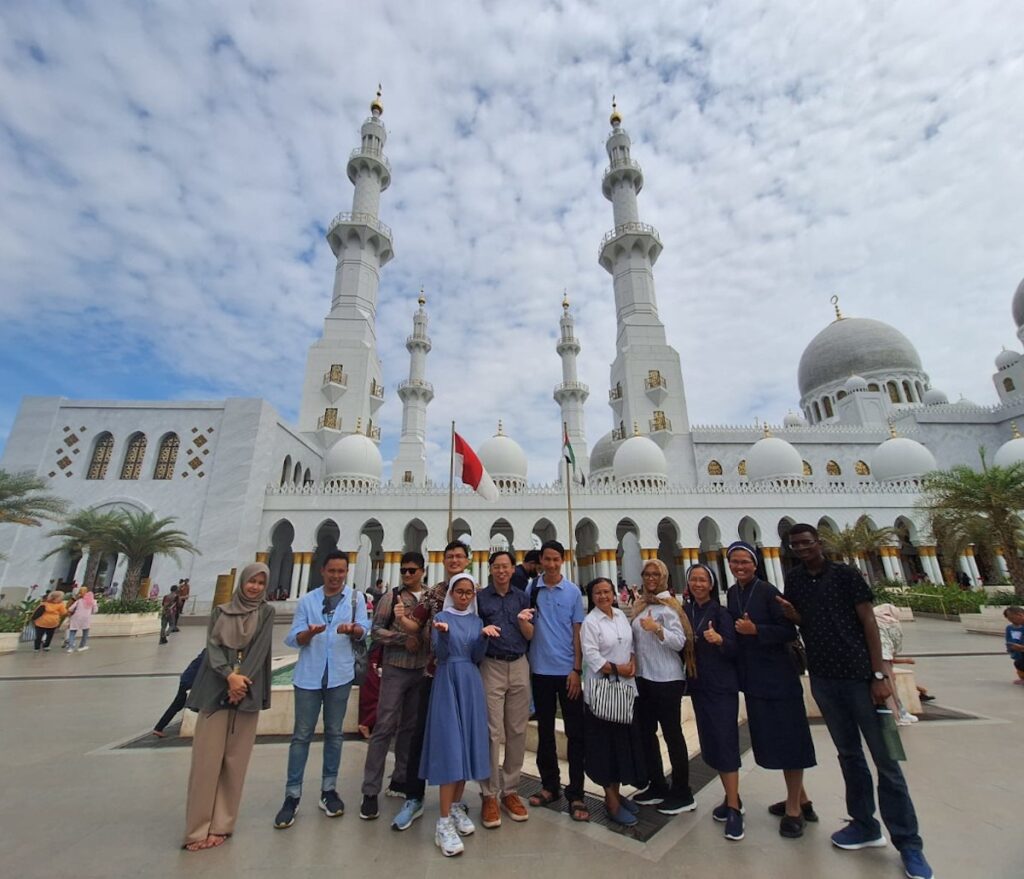Filipino Scholastic Mark Lopez SJ shares on his experience of a five-day Vipassana Meditation Retreat he did in Chiang Mai last summer under the Venerable Abbot Piyatassi Bhikku. The retreat was part of the month-long East Asian Theological Encounter Programme, which provides Jesuits in formation with opportunities to deepen their dialogue with other faiths, particularly Buddhism, and to enrich their perspectives on theology in Asia.
“No God for 5 days.” That was the deal. We were not to speak to, address, nor think about God for the duration of the Buddhist retreat. This was what the Venerable Abbot told us at the start of the retreat. And this made even the least godly of us Jesuit Scholastics and brothers uneasy. But then the Abbot, probably sensing our apprehension, quickly added “after 5 days, then you can take whatever you learn here and offer it to your God”.
“Sold!” This was a good bargain, I thought, and the monk a good salesman, not unlike the ones I encountered at the Chatuchak market on route to our EATEP course in Thailand.
The excitement and anxieties that led up to the retreat were many. We would be living in a monastery. The place was nicely nestled in lush forest. We would be hosted by a community of Theravada Buddhist monks. We were excited to experience their noble silence. But we also had to eat only their vegetarian food. We were to take no solids after noon, wake at 4 am every day, and meditate for at least eight hour-long periods each day. Among the 15 of us Jesuits, worries varied in degree, but all shared the same deeper apprehension: Could we really let go of our God for five whole days? Would it all be worth it?
By the end of the retreat, it was clear and unanimous. All of us had experienced many things beautiful, mysterious, deeply personal and potentially transformative in that monastery. And the irony was, in each of our own personal ways, we felt closer to God after those five days of not being allowed to address God directly. How was this so?
The instructions to the meditation were simple. After finding our ideal meditation position (mine was the lotus), we were to become acutely aware of our breath. We became mindful of how it traversed from the air around us, through our nostrils, down the air passages, into the lungs, expanding the diaphragm and back muscles and vice versa.
After observing our breath closely for some time, random thoughts would surface. These were like a stream of memories and hopes, at times rushing forth in torrents and waves, but sometimes mellowing to a gentle trickle. We were to simply observe and see: Were these thoughts of the past or plans of the future? Did we like or not like these memories or thoughts?
Interestingly, just as the venerable teacher told us, once we became aware of these thoughts and could gently answer these questions and “categorize” the thoughts, they began to dissipate and seemed to lose their hold on our minds. When this happened, we were to return to the awareness of our breath. Always, in all things, the rule of thumb was to proceed gently and with loving kindness to the self.
The sense of this practice eluded me at first. After some days of trying it out, however, the Abbot enlightened us by explaining that what we were learning to do was to be neutral observers to our thoughts and even to our feelings.
Nurturing our faculty for awareness became key to developing the interior space and freedom in which we had become more of the “I” that was merely observing (and not reacting to nor judging) these thoughts. The feeling was akin to what I have experienced in spiritual direction. As both directee and director, I have seen how the simple practice of regularly being able to talk openly to someone about our struggles and our desolations develops and strengthens a part of us and our interiority which allows us to transcend these struggles.
Interestingly, after the first few days of the Vipassana retreat, this game of observing the mind and what it was giving me, took an exciting turn. I came upon thoughts that seemed to be more stubborn and powerful than others. They seemed to clutch on to my mind more powerfully, unwilling to pass on. Sometimes these were fears of responsibilities I had to take on. Sometimes these were plans that gave me joy. And as I reflected on the nature of these stubborn thoughts, I realized they were very much revelatory of my deepest attachments, things I really, really wanted. Not so much material things, but the things I hungered for – attention, appreciation – what the Master Ignatius would perhaps call my inordinate desires. And so, the Vipassana method, became a very powerful way to surface and shed light on these. At the same time, this method of meditating was an exercise, which developed an interiority that enables me to transcend those attachments.
First of all, therefore, our feeling of drawing nearer to God was a consequence of finding a new path towards greater interior freedom. In the Ignatian tradition, we know that this freedom is what allows us to serve God with greater generosity and availability. It is also, no less, what God most deeply desires for us, so that God can love us more fully.
Secondly, this Buddhist practice of meditation presented me a way toward growing in two very Christian virtues: kindness and compassion. Explicitly, these virtues were carried by a beautiful blessing that we were instructed to pray at the start and end of every meditation period: “May all beings be blessed by loving kindness and compassion.”
As our faculties to be neutral observers were enhanced by the meditations (inside and outside of formal prayer periods), the power of this blessing became more and more felt. At times when I remembered my loved ones in meditation, the blessing was a way to pray loving kindness and compassion for them, while also becoming more grateful for the love and compassion so many of them have shown me throughout my life. At times when I would become hard on myself, becoming impatient with the meditations which seemed to go nowhere, the blessing would be a reminder for me to be gentler with myself and not to push too hard. When I remembered people for whom I harboured anger or frustration, to utter the blessing became a challenge. But when I found the courage and strength to do so, I surprisingly found that the blessing helped to ease my hurt, let go of my anger, and convince me that perhaps I would be capable of showing this person more kindness the next time I came across him or her. “May all beings be blessed by loving kindness and compassion” – at times, this statement became a source of hope, sometimes of healing, sometimes a reminder, at times a challenge, but always a true prayer.
Some days, as we walked through the monastery grounds, forest birds would fly through the trees around us and would burst forth into song. In those moments, they too, along with all of creation, would evoke this kindness and compassion. As I marvelled at the beauty of nature, my heart so naturally spoke the same blessing. “May all beings be blessed by loving kindness and compassion.” On other days, when snakes crossed our path or when bees became a nuisance to our meditations, what a challenge it again was to utter the same prayer for these creatures! But eventually, we also learned to do so. With the Buddhist blessing, we were constantly reminded and challenged to extend this loving kindness, compassion and unconditional positive regard, without exception.
I eventually came to intuit that this phrase of blessing was directly related to our learning how to be neutral observers of all things. Remaining neutral and trying to merely see and accept things as they were, and not as we thought they should be, was a very non-judgmental, unimposing, non-demanding way of being and relating. It was compassion and loving kindness in action (or non-action!). I think this came to me as I recalled the many times when my own quickness to judge and the labels and categories I like to give people and experiences were ways that I inflicted violence upon others, ways I was uncharitable and did not listen carefully, ways in which compassion was deficient. Neutral observation was in fact a way of loving kindness and compassion in itself. And to grow in these virtues was to draw closer to God, the very source and summit of these virtues and whose very nature is love.
Lastly, I think that through the meditation techniques which the Venerable Abbot taught us and by his instruction not to address or think about God during those five days, we found a way of being present to and coming before the Holy, without demand or expectation. Like those special moments when no words are necessary between lovers or friends, when each other’s mere presence and accompaniment gives joy and peace, that is how the noble silence felt. By my silence and by this temporary letting go of God, it felt like I had set my God free –free from all my nagging and wanting; my controlling and my neediness.
After my retreat, I chanced upon the late great Anthony de Mello’s book “Awareness.” I was struck by the following lines, which helped me make sense of how it was that my “letting go of God” seemed to bring me to a different way of more freely relating with God:
“Think of someone or something you are attached to; in other words something or someone without which or without whom you are not going to be happy. It could be your job, your career, your profession, your friend, your money, whatever. And say to this object or person ‘I really do not need you to be happy.
I’m only deluding myself in the belief that without you I will not be happy. But I really don’t need you for my happiness; I can be happy without you. You are not my happiness, you are not my joy.’ If your attachment is a person, he or she is not going to be happy to hear you say this, but go ahead anyway. You can say it in the secrecy of your heart. In any case, you’ll be making contact with the truth; you’ll be smashing through a fantasy. Happiness is a state of non-illusion, of dropping the illusion …”
I was afraid to say this, but I talked to God and I told him that I didn’t need Him. My initial reaction was: “This is so contrary to everything I’ve been brought up with.” Now, some people want to make an exception of their attachment to God. They say, “If God is the God that I think he ought to be, He’s not going to like it when I give up my attachment to him!” All right, if you think that unless you get God you’re not going to be happy, then this “God” you’re thinking of has nothing to do with the real God. You’re thinking of a dream state. You’re thinking of your concept. Sometimes you have to get “rid” of God in order to find God. Lots of mystics tell us that.
While no person of faith will contest that we do truly need God, I think de Mello’s point is much related to the fact that often, we are not aware that the way we conceive of and relate to God bears our anxieties, our possessiveness and our clinginess. And as in our human relationships, these are hindrances to our growth and maturity in our relationship with God. “We’ve been so blinded by everything that we have not discovered the basic truth that attachments hurt rather than help relationships … It is a delight to be with [our friends or with God] when I am enjoying them on a non-clinging basis” de Mello writes.
By now the reader can glean how strong the equivalences are between Ignatian and Buddhist spiritualities. Spiritual freedom, detachment, indifference, kindness, compassion, love manifest in deeds. The awareness of what preoccupies us, what we are attracted or averse to, our consolations and desolations. At times, the meditations actually felt like long Examens. And a quick review of de Mello’s writings quickly confirmed my suspicion that everything that our Venerable Abbot taught us, de Mello had already appropriated to the Ignatian context.
By sharing the above, however, I hope to strengthen and encourage those who have at some time felt the desire to explore and deepen their personal spiritualities through meditative practices like Yoga, Pilates, Tai Chi or Vipassana, which have become more popular and accessible in the Philippines. If there is fear of going astray from the Christian tradition, I hope my experiences can help quell these fears. I honestly believe that what I have learned from our Buddhist brothers has the potential to make me a better Christian. Learning about the Buddhist tradition has deepened my appreciation not only for the Buddhist spirituality, but for our own as well. Travels to foreign lands have made me see more clearly what is Filipino about me, and how there is so much to love about our own culture and our own country. In the same way, I emerge from my Buddhist encounters loving and more strongly desiring to live out all that is Ignatian.
To read about the East Asian Theological Encounter Programme 2012, click here.
For more information about the East Asian Theological Encounter Programme, visit www.freewebs.com/johnjshea.


